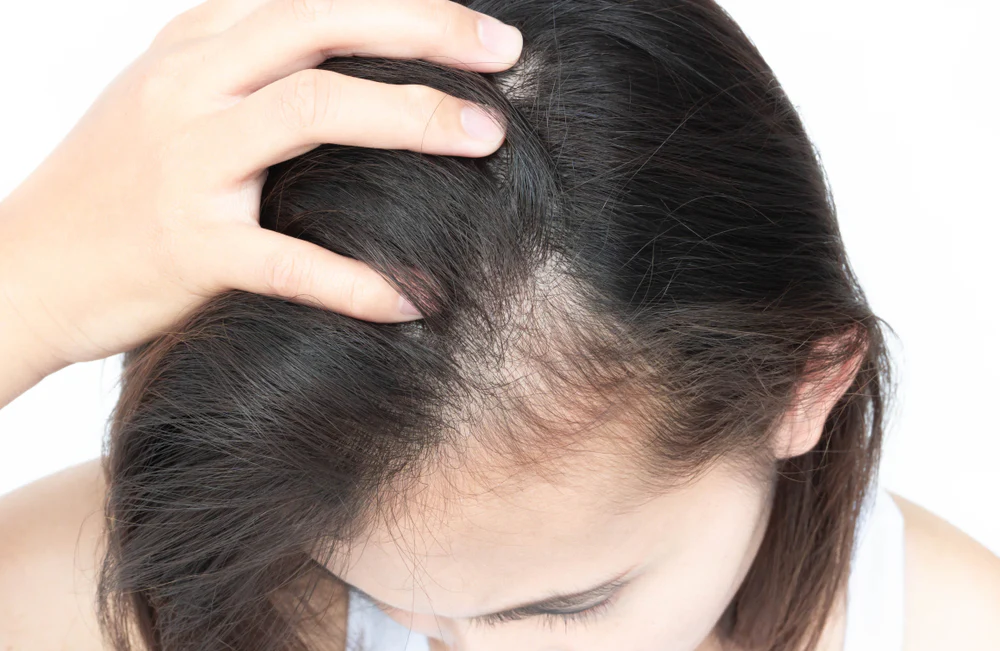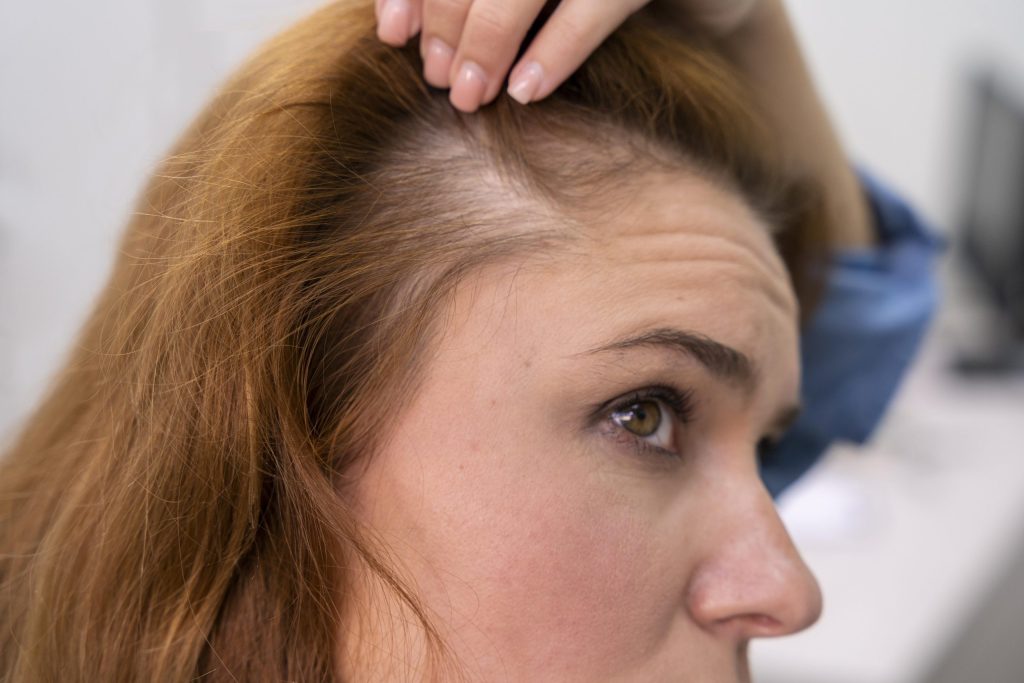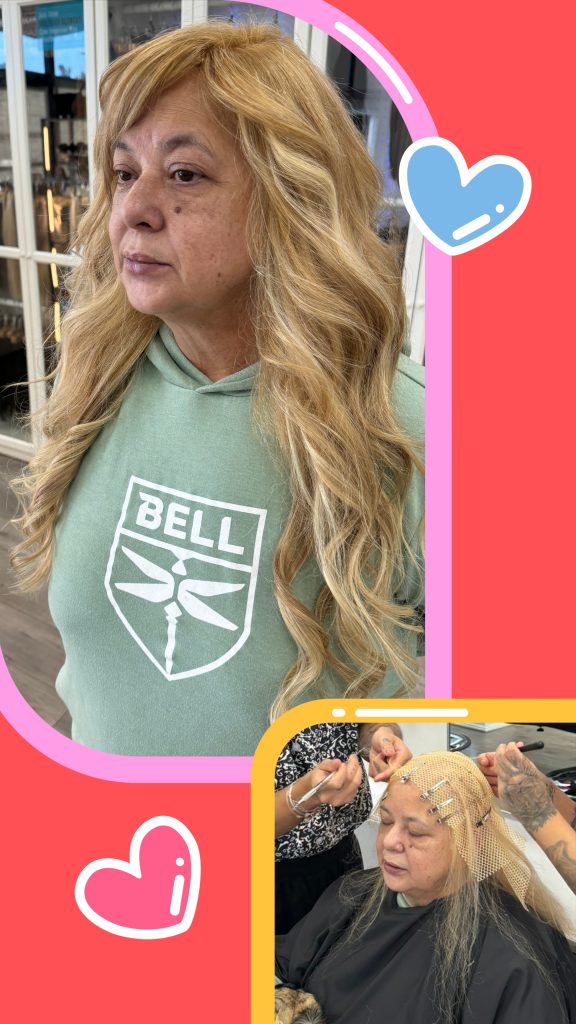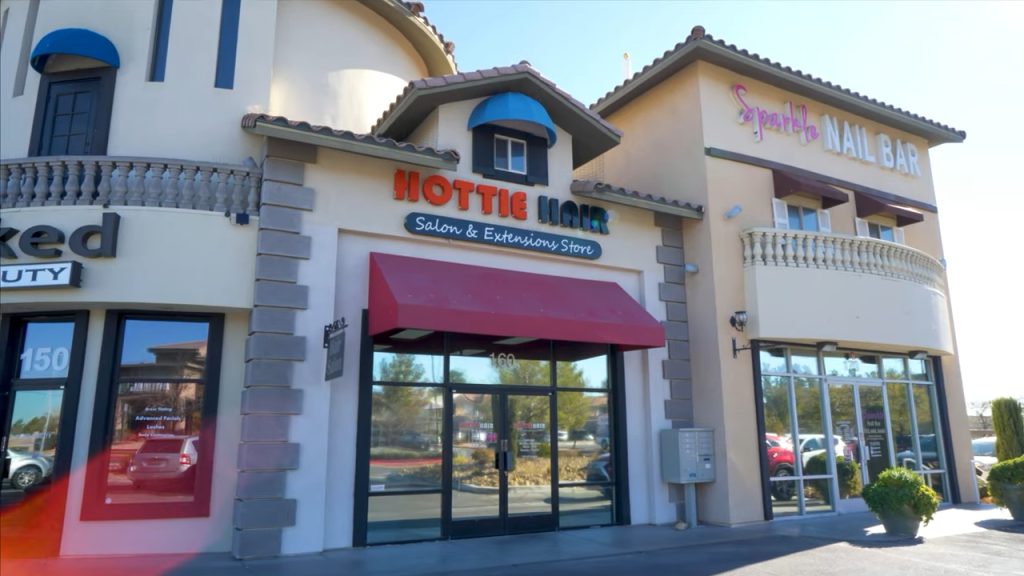1500+ ★★★★★ REVIEWS
Understanding Stress-Related Hair Loss and Effective Solutions

Hair loss can be distressing, especially when caused by stress. Many people experience stress-related hair thinning due to physical or emotional stress, which can disrupt the natural hair growth cycle. This article explores how stress impacts hair health, medical and non-medical solutions, and how Hottie Hair Salon & Extensions Store can help restore confidence.
Table of Contents
How Does Stress Cause Hair Loss?
Stress can contribute to hair loss by disrupting the natural hair growth cycle and triggering excessive shedding. High levels of stress can lead to conditions such as telogen effluvium, where hair follicles enter a resting phase prematurely, causing noticeable thinning. Chronic stress may also contribute to alopecia areata, an autoimmune condition that results in patchy hair loss. Additionally, stress-related habits like excessive hair pulling (trichotillomania) or poor diet can further impact hair health. Managing stress through relaxation techniques, a balanced diet, and proper self-care can help reduce its effects on hair loss.
Stress-related hair loss typically falls into three categories:
- Telogen Effluvium: This is the most common form of stress-induced hair loss. High levels of stress push hair follicles into a resting phase, leading to excessive shedding.
- Alopecia Areata: This autoimmune condition is triggered by stress and results in sudden patchy hair loss.
- Trichotillomania: A psychological condition where individuals compulsively pull out their hair due to stress or anxiety.

Medical Solutions for Stress-Related Hair Loss
Medical solutions for stress-related hair loss focus on treating both the underlying stress and the hair loss itself. Doctors may recommend medications like minoxidil to stimulate hair regrowth or supplements to support hair health. In cases of severe shedding, low-level laser therapy or platelet-rich plasma (PRP) treatments may help strengthen hair follicles. Addressing stress through therapy, lifestyle changes, or relaxation techniques is also essential for long-term improvement. Consulting a healthcare professional can help determine the best treatment plan based on individual needs.
The good news is that stress-related hair loss is usually temporary and can be reversed with the right treatments:
- Reducing Stress: Techniques such as meditation, yoga, and therapy help regulate stress hormones that affect hair growth.
- Nutritional Support: A diet rich in iron, biotin, and omega-3 fatty acids can promote hair regrowth.
- Minoxidil (Rogaine): This FDA-approved treatment stimulates hair follicles and promotes growth.
- Consultation with a Dermatologist: Seeking professional advice can help determine if additional treatments, such as platelet-rich plasma (PRP) therapy, are necessary.
For further medical guidance, refer to resources from the American Academy of Dermatology and the National Institutes of Health.
Non-Medical Solutions: Enhancing Your Hair’s Appearance
Non-medical solutions for hair loss focus on enhancing your hair’s appearance while promoting confidence and style. Options like hair toppers, wigs, and extensions provide instant volume and coverage, offering a natural look without medical treatments. Styling techniques, volumizing products, and strategic haircuts can also help create the illusion of fuller hair. Additionally, gentle hair care routines and scalp massages can improve overall hair health. These solutions offer flexibility for those seeking immediate results while exploring long-term hair regrowth options.

1. Mesh Integration Systems
Mesh integration is an excellent semi-permanent solution for thinning hair. This method involves attaching a breathable mesh base to the scalp, onto which natural hair extensions are secured. It provides a seamless, voluminous look without the need for surgery or medication.
2. Clip-On Toppers
Clip-on toppers are a quick and easy way to add volume to thinning hair. They blend effortlessly with natural hair and provide instant coverage for problem areas.
3. Wigs and Hairpieces
Modern wigs offer an incredibly realistic look and feel. Whether made from synthetic or human hair, high-quality wigs provide an easy way to maintain a full and stylish appearance.

Why Choose Hottie Hair Salon & Extensions Store?
Hottie Hair Salon & Extensions Store is a top choice for those looking for high-quality hair solutions, expert styling, and personalized service. Specializing in premium hair extensions, toppers, and customized hair enhancements, Hottie Hair offers a wide range of options to suit different hair types and preferences. Their experienced stylists provide professional consultations to ensure a perfect match and seamless integration for a natural look. With a commitment to quality, customer satisfaction, and the latest hair trends, Hottie Hair Salon & Extensions Store is the go-to destination for achieving fuller, more beautiful hair.
At Hottie Hair Salon & Extensions Store, we specialize in non-medical hair restoration solutions tailored to your needs. Our services include:
- Customized Hair Extensions for a natural, voluminous look.
- High-Quality Wigs and Toppers for an instant hair transformation.
- Professional Mesh Integration Services for long-term solutions to hair thinning.
Final Thoughts: Find the Right Solution for You
Stress-related hair loss can be overwhelming, but there are solutions available. Reducing stress, consulting a dermatologist, and utilizing non-medical hair enhancements can help restore both hair and confidence.
Book a consultation today at Hottie Hair Salon & Extensions Store and explore the best options for you!
FAQ: Stress-Related Hair Loss
1. Can stress cause permanent hair loss?
Stress-related hair loss is usually temporary, but in some cases, it can contribute to long-term thinning or permanent hair loss. Conditions like telogen effluvium, where hair enters a resting phase prematurely, often resolve once stress levels decrease, allowing hair to regrow over time. However, chronic stress can also trigger or worsen conditions like androgenic alopecia (pattern baldness) or alopecia areata, which may lead to prolonged or irreversible hair loss. Managing stress through relaxation techniques, a healthy diet, and proper hair care can help minimize its effects, but if hair loss persists, consulting a healthcare professional is recommended to determine the best course of action.
2. How long does it take for hair to grow back after stress-related hair loss?
Hair regrowth after stress-related hair loss typically begins within three to six months once the underlying stress is managed. In cases of telogen effluvium, where hair prematurely enters the shedding phase, new growth usually becomes noticeable within a few months, with full recovery taking anywhere from six months to a year. However, if stress persists or triggers conditions like androgenic alopecia or alopecia areata, regrowth may take longer or require medical intervention. Maintaining a healthy lifestyle, reducing stress, and using gentle hair care practices can help support the regrowth process. If hair loss continues beyond a year, consulting a healthcare professional is recommended.
3. What are the best hairstyles for thinning hair due to stress?
The best hairstyles for thinning hair due to stress focus on adding volume and creating the illusion of fullness. Layered cuts, such as a textured bob or a shoulder-length shag, can give hair more body and movement. Soft waves or curls can also add dimension, making hair appear thicker. Side parts and tousled styles help disguise thinning areas, while bangs or face-framing layers can draw attention away from sparse spots. Using volumizing products, dry shampoo, or light teasing at the roots can further enhance the look. For extra coverage, clip-in extensions or hair toppers offer a natural-looking way to boost volume instantly.
4. Can diet improve hair loss caused by stress?
Yes, a nutrient-rich diet can help improve hair loss caused by stress by supporting overall hair health and promoting regrowth. Essential vitamins and minerals like biotin, vitamin D, iron, and zinc play a crucial role in strengthening hair follicles and preventing excessive shedding. Protein-rich foods, such as eggs, fish, and nuts, provide the building blocks for hair growth, while omega-3 fatty acids from sources like salmon and flaxseeds can help nourish the scalp. Staying hydrated and reducing processed foods and excessive caffeine intake can also support hair health. While diet alone may not completely reverse stress-related hair loss, it can significantly aid in recovery when combined with stress management and proper hair care.
5. Where can I find non-medical solutions for stress-related hair loss?
If you’re looking for non-medical solutions to manage stress-related hair loss, Hottie Hair Salon & Extensions Store offers a wide range of high-quality wigs, toppers, and extensions to help restore confidence and enhance your hair’s appearance. Their expertly crafted hairpieces come in various styles, lengths, and colors, ensuring a natural and seamless look. Whether you need extra volume, coverage for thinning areas, or a complete transformation, Hottie Hair provides personalized consultations to find the perfect solution for your needs. With premium products and professional styling services, they are a trusted destination for achieving fuller, more beautiful hair.
For more information, visit the American Academy of Dermatology and the National Institutes of Health.
You must be logged in to post a comment.